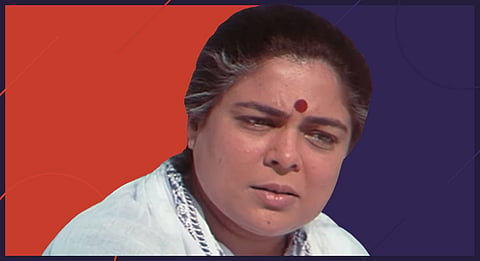
- In-Depth Stories
- Web Stories
- Reviews
- News
- FC Lists
- Interviews
- Features
- FC SpecialsFC Specials

In this weekly series, Rahul Desai lists 50 of Hindi cinema's favourite "third wheels" – that is, memorable characters whose roles are little more than fleeting cameos and little less than supporting turns – since 1990. There will be no particular order: just a colourful recollection of emblematic faces who've left us craving for more.
There was a time in 90s' Hindi cinema when it seemed like the entire archetype of the 'traditional' Indian mother played the roles of Rakhee, Farida Jalal and the late Reema Lagoo – instead of the other way around. While the cinematic dynamic of Bollywood parenting has evolved since then, the three actresses and their ubiquitous maternal presence had an undeniable impression on my young mind.
If an actress above the age of 35 dared to work in the industry, they stood the misfortune of being slotted into the mother, stepmother, evil-aunt or grandmother category. Like the other two, Lagoo, an accomplished Marathi actress, appeared in innumerable Hindi films across the decade, regularly slotting in as the "hero's mother" irrespective of how old the heroes were. Despite competent turns in the more famous titles such as Maine Pyaar Kiya, Aashiqui, Hum Aapke Hai Koun…! and Kuch Kuch Hota Hai, I still remember her stern-maa act in Yeh Dillagi opposite an affable Saeed Jaffrey – mostly for the anomaly that hers was an assertive matriarch that went against type and inspired fear in the film's males, including a young Akshay Kumar and Saif Ali Khan.
But perhaps her most significant role occurred – as was the case with so many other actors in this film – in Mahesh Manjrekar's hard-hitting underworld drama, Vaastav (1999). In his career's definitive performance, a 39-year-old Sanjay Dutt poured his soul out in a crime movie that could have well been autobiographical if his youth were a tad more misspent. From the gullible pav-bhaji-stall-running chawl rogue to the substance-abusing, power-drunk and remorseless city gangster, Raghu's is a story not unfamiliar in its form.
The "victim of circumstances" trope is one that is often misused by filmmakers in trying to achieve a balance between the family-loving don and cold-blooded killer. Most films end up glorifying – and sympathizing with – the character because of the star/actor playing it, more in a dangerous-hero style than a reluctant-villain way.
Vaastav stands out because it refrains from doing so, and paints Raghu as a lost child instead. This is primarily because we are constantly made to view Raghu with the conflicted perspective of his disapproving, heartbroken mother, Shanta Shivalkar. When he boasts about "pachchas tola," guns and wealth, we can't help but feel sorry for him rather than be intimidated – or impressed – by his "rise".
Lagoo's performance is central to this theme, and sets Vaastav apart from an Agneepath (1990) or even a Baazigar (1993) – companion pieces about vengeful murderers who are forgiven when they die in their mothers' laps. An inherently complicated equation is over-simplified when Rohini Hattangadi, eight years younger than 'son' Amitabh Bachchan, spends the entirety of Agneepath being ashamed of her son only to have her heart melt when he heroically sacrifices himself in the end. In Baazigar, Rakhi Gulzar is given a mental illness so that she doesn't recognize the monstrous dichotomy of her son (Shah Rukh) who is both the film's hero and villain.
Shanta, however, is so disillusioned by her naïve boy's transformation into a monster that she ensures we don't imagine any kind of redemption for him; Lagoo (a mere year older than Dutt) amplifies her pain every time she looks at him, torn between blaming herself and the system that robbed him of his modest principles. For her, there is no justification for his descent into darkness. In the end, she's the one who has to pull the trigger – as an act of love as well as humanity.
In what went down as one of the iconic scenes of the decade, Shanta cradles a paranoid, hallucinating and drug-addled Raghu after he slaughters his rival gang. There is nobody left to kill, nothing left to prove. Manjrekar designs the scene with an eye on every other eye in the house. Raghu's wife (Namrata Shirodkar) realizes how irrevocably damaged and hopeless he is. She watches, silently, as a mother pacifies her desperate son in the backyard. She closes her eyes, knowingly, when that mother pumps a bullet into her son's head to grant him "mukti (freedom)". The loud connotations of this moment reverberated through the moral ambiguity of the 1990s. When everyone rushes out to see Raghu's lifeless body, Lagoo turns a bout of expository dialogue – ideas that critics and film enthusiasts are meant to interpret – into a perfectly organic piece of mental disintegration. She repeats to everyone around her that she didn't kill him but set him free, because her son had actually died long ago.
The final shot of the film is even more important in context of the genre it represents: a sad Shanta tells her grandson that half the world would be gangsters if they let circumstances become their excuse. I'm not big on social messages, but in 1999 this is a line that might have course-corrected an entire generation of teenagers determined to elevate recklessness into an aspirational art form.